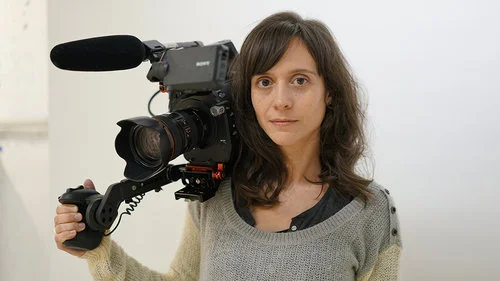Rachel Lears
“Ordinary people can build new kinds of power”
An interview with Rachel Lears, director of “Knock Down the House”
In her timely, moving, and inspiring campaign documentary, filmmaker Rachel Lears follows charismatic rising progressive star Alexandria Ocasio-Cortez and three other insurgent female candidates running for Congress in 2018. Winner of the Audience Award at the Sundance Film Festival, “Knock Down the House” follows in the footsteps of Lears’ previous feature film, “The Hand that Feeds,” a similarly inspiring story of outsiders seeking power and justice. Called “thrilling” (Slate), “vivid” (New York Times), and “extraordinary” (The Hollywood Reporter), “Knock Down the House” promises to be one of the year’s most stirring films. Lears speaks below about her interest in character-driven stories, emotional moments, and inspiring people who feel left out of the political process.
Your last documentary “The Hand That Feeds” was actually quite similar in many regards: You follow a group of political outsiders (in that case, fast-food restaurant workers) who take on powerful interests through political action. What attracts you to these kinds of stories?
I’m always looking for stories that will work as a character-based verite narrative, human stories of courage and personal transformation that can be as entertaining as a fiction film. At the same time, I want to tell these stories in a way that reveals deeper cultural, social and political structures and conflicts. “Knock Down the House” and “The Hand That Feeds” both explore power and solidarity— showing how power works through political machines and labor relations, respectively, and how ordinary people can build new kinds of power by acting collectively.
Both films also have a similar gripping David & Goliath conflict as a key structuring device. How do you think making “The Hand that Feeds” influenced your making of this film?
We started both projects with the faith that our underdog subjects were going to be doing something interesting that would be compelling to watch whether they won or lost; we were incredibly fortunate in both cases that the results were so dramatic. Beyond the thematic parallels, “Knock Down the House” builds upon our work with “The Hand That Feeds” stylistically in that both films interweave observational material and intimate interviews into solid narrative arcs. Being able to show “The Hand That Feeds” to the subjects of “Knock Down the House” at the beginning of the project was also crucial to building trust.
Without giving too much away, there’s a very moving scene at the end of the film with Ocasio-Cortez in D.C. How did this moment come about, and did you intuitively know at the time that the film would culminate with it? Or did you find that in the editing room?
When I heard that Alexandria was traveling to DC on this particular occasion, I knew it would be important to the story to be there. But beyond what she already had planned, I especially hoped to take her to a particular location to see what would happen there—luckily we were able to arrange this for about a half hour between other engagements. What happened was a very emotional and beautiful moment and it immediately felt crucial. We edited the scene that same week for a work sample, and pretty much kept it as the ending throughout the edit.
Do you hope the film inspires other outsiders to get involved politically? And are you involved in that cause in the same way you were involved in the Fight for $15 minimum wage campaign around “The Hand That Feeds”?
We hope “Knock Down the House” engages people to think about the intrinsic relationship between money in politics and representation, and inspires them to participate in new ways, from voting to organizing to running for office. We especially hope that the film can reach people who feel left out of the political process or cynical about how it works—they might see themselves reflected in our protagonists and their communities, and the story might convey a bit of hope for how democracy can work. Because we operate under non-profit rules (receiving funding via a 501c3 fiscal sponsor) and want to maintain journalistic independence, we didn’t share footage with the campaigns for their own promotional purposes, and the film won’t be used to fundraise for campaigns. (With “The Hand That Feeds,” the subjects were also a non-profit, so they were able to use material from the film for promotional purposes, and various grassroots non-profits did use the film for fundraising.) For the Netflix release of this film, we’re planning an extensive impact campaign that will center on civic engagement, education, and empowering viewers to understand the democratic process and expand their own roles within it.

